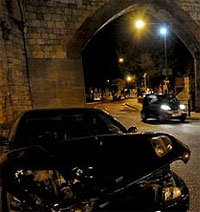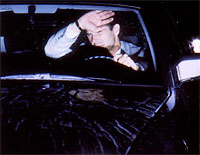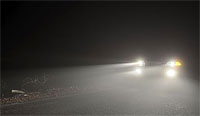The setting of our clocks back to Greenwich Mean Time (GMT), pedestrians, riders and drivers can hear the ticking of a time bomb about to explode and cause injuries and deaths figures on our roads to increase by a minimum 10%!
 Each year, at the end of British Summer Time approaches, the darker evenings and decreased visibility means that the roads become even more dangerous, with statistics from the Department for Transport (DfT) showing a 10 per cent rise in the number of cyclists killed on Great Britain’s roads in 2012, with the number of child cyclists killed doubling.
Each year, at the end of British Summer Time approaches, the darker evenings and decreased visibility means that the roads become even more dangerous, with statistics from the Department for Transport (DfT) showing a 10 per cent rise in the number of cyclists killed on Great Britain’s roads in 2012, with the number of child cyclists killed doubling.
Rick Wood, Head of Driver Training at RoSPA writing in his blog for RoSPA explains further:
“It’s not just pedestrians and cyclists who are at increased risk though – if you commute or drive for work then DST can be a real threat to your safety, with research showing that around 80 deaths and at least 200 serious injuries could be prevented every year if we moved to Single/Double Summer Time (SDST: GMT+1 in winter / GMT+2 in summer).
While RoSPA has campaigned for this switch for decades, for the time being darker evenings are a dangerous reality. With this in mind we have produced a short guide, specifically aimed at fleet managers and those who drive for work.”
Ricks says that we should all prepare our vehicles, but in particular check:
- All lights – exterior and interior – are functioning correctly
- Windscreen, wiper blades and other windows are clean and the washer bottle filled with screen wash (dirty windows can further reduce visibility)
- Tyre condition, tread depth and pressure (of all the tyres, including the spare)
- Brakes are working well
- Fluids are kept topped up, especially windscreen wash, anti-freeze and oil
If you are driving a vehicle that is not your own, you should also take a few minutes to familiarise yourself with the controls.
 Driving smartly is always one way of minimising your risks from driving during the months we are in GMT. Rick gives the following advice:
Driving smartly is always one way of minimising your risks from driving during the months we are in GMT. Rick gives the following advice:
“Ideally you should try to arrange your journey so that you are travelling in the safest possible conditions. Obviously, this is not always possible, and it is therefore sensible to adapt your driving to the darker conditions. Things to consider include:
- Reduce your speed and keep it down
- Do not ‘hang on’ to the rear lights of the car in front as you will be too close to be able to brake safely
- Switch off distracting noises and open the window slightly so that you can listen for other traffic, especially at crossroads and junctions
- Anticipate the road ahead – look out for signs and scan the tops of hills for lights which could signal oncoming traffic
- Don’t use full beam in the face of oncoming drivers. Dip your headlights.Be especially careful when overtaking at night. Be sure you can see the road ahead is clear enough for you to complete the manoeuvre safely – if in doubt, hold back
Finally, make sure you plan your journey in advance and leave enough time – driving under pressure is dangerous at any time of day, let alone in the dark!”
 Rick’s advice ends with the issue of extra training for driving during the Autumn and Winter months, including defensive driving techniques, and driver theory workshops for employers to ensure that all those who drive for work purposes understand the principles of defensive driving.
Rick’s advice ends with the issue of extra training for driving during the Autumn and Winter months, including defensive driving techniques, and driver theory workshops for employers to ensure that all those who drive for work purposes understand the principles of defensive driving.
As previously stated, RoSPA has been campaigning for many years for the introduction of what they call ‘Single/Double Summer Time, and they provide full details of their campaign on their website here
You can also download direct from the Unionsafety E-Library Database, a copy of RoSPA’s Single Double British Summertime Factsheet by using keywords “Daylight Saving”.
You can read more of Rick Wood's road safety blogs here
Source: RoSPA / Rick Wood / Unionsafety


 Each year, at the end of British Summer Time approaches, the darker evenings and decreased visibility means that the roads become even more dangerous, with statistics from the Department for Transport (DfT) showing a 10 per cent rise in the number of cyclists killed on Great Britain’s roads in 2012, with the number of child cyclists killed doubling.
Each year, at the end of British Summer Time approaches, the darker evenings and decreased visibility means that the roads become even more dangerous, with statistics from the Department for Transport (DfT) showing a 10 per cent rise in the number of cyclists killed on Great Britain’s roads in 2012, with the number of child cyclists killed doubling. Driving smartly is always one way of minimising your risks from driving during the months we are in GMT. Rick gives the following advice:
Driving smartly is always one way of minimising your risks from driving during the months we are in GMT. Rick gives the following advice: Rick’s advice ends with the issue of extra training for driving during the Autumn and Winter months, including defensive driving techniques, and driver theory workshops for employers to ensure that all those who drive for work purposes understand the principles of defensive driving.
Rick’s advice ends with the issue of extra training for driving during the Autumn and Winter months, including defensive driving techniques, and driver theory workshops for employers to ensure that all those who drive for work purposes understand the principles of defensive driving.